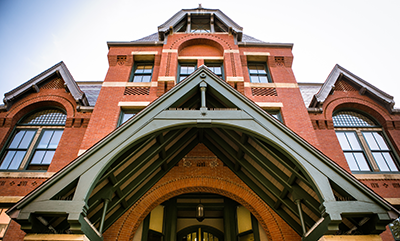On Las Vegas and the Persistent Challenge of Firearms.
 In 2016, I wrote an op-ed in the Boston Globe about the Orlando shooting, then the deadliest mass shooting in US history. Last night, a gunman killed at least 58 people, and injured more than 500, at a country music festival in Las Vegas. This makes it, for now, what Orlando was—the worst of these events our country has seen.
In 2016, I wrote an op-ed in the Boston Globe about the Orlando shooting, then the deadliest mass shooting in US history. Last night, a gunman killed at least 58 people, and injured more than 500, at a country music festival in Las Vegas. This makes it, for now, what Orlando was—the worst of these events our country has seen.
I have only been dean of this school since 2015, yet I have already had cause to acknowledge mass shootings to our community seemingly countless times—after Umpqua, after Dallas, and, most recently, after the shooting in Plano, Texas. Every time these events occur, I try to find a new way of saying what we all know: that mass shootings are a uniquely American epidemic, that we could mitigate this public health crisis through commonsense gun laws passed at the federal level, that the political inertia around this issue is literally killing people. Every time, I look for a new way to phrase it. But not today.
Today I will repeat, nearly word-for-word, what I wrote after Orlando. Because what I wrote then still applies. It applies today, and it will apply after the next, worse, mass shooting that absolutely will occur unless we summon the political will to finally do something about this.
Just this year, there have already been 273 verified mass shootings in the US. More broadly, there have been more than 11,000 firearm-related deaths, more than 23,000 injuries, and more than 1,500 accidental shootings. While it is mass shootings that get the most attention, we must not forget that 93 Americans are killed by guns each day, three times as many are injured, and 25 children die from firearms weekly. In 2013, the US suffered more than 30,000 total gun deaths—and there is no reason to think we will not see similarly horrific numbers by the end of this year. It would not be hyperbolic to say that, in the US, this type of event has become routine.
Just last week, our school hosted a seminar where we discussed the stories behind gun violence statistics. Our speakers included Clementina Chéry, whose son was killed by a gun, and Mark Barden, who lost his son in the Sandy Hook shooting. Their stories reminded us that for every gun violence casualty, there is a whole network of family and friends whose lives are irreparably harmed by the loss.
When will we say “enough”?
We do not yet know the motives of the Las Vegas shooter. But chances are his actions were inspired by hate. Hate has taken over more and more of our public stage in recent years—whether directed at countries, specific communities, or individuals. We have seen it domestically, in Charlottesville and Alexandria, and in the hate-filled rhetoric that has dominated our political conversation. And we have seen it globally, with the rise of Isis and terror attacks around the world. We even face the real possibility that the hate speech of President Donald Trump and North Korean leader Kim Jong-un could lead to a nuclear war.
These forces create a kind of echo chamber, where noisy threats and bluster, punctuated by tragic news reports like today’s, can drown out the voices of civility and tolerance.
And these forces are given voice—and a chance to realize their worst impulses—because we are awash in deadly weapons. Because we consider it acceptable to let abundantly available guns cause violence in this country. We allow this despite legions of grieving parents, destroyed families, and a clear consensus on the part of the American people that our gun laws need to be changed. Despite all this, we keep waking up to scenes like Orlando and Las Vegas. Our Congress continues to shirk its responsibility on this issue, even blocking funding to the Centers for Disease Control and Prevention to research this glaring national problem. With this state of affairs, we have moved beyond numbness towards, shamefully, a kind of complicity.
顾
When we as a society prioritize the proliferation of deadly weapons over the safety of our communities, we signal our peace with the status quo. We say that we can live with the possibility that an angry, spiteful person could, at any time, access an assault rifle and use deadly force to broadcast his grievance to the world. Until we are ready to work towards making the acceptable unacceptable, there are, in reality, no “lone” gunmen. They are abetted by the society they attack. It was true after Orlando. It is true now.
As bleak as today feels, I remain encouraged by the work of our school, and by the ever-present potential for change. It is inspiring to be part of a community that is working to bring this change about, and a source of consolation at this sad time.
Warm regards,
Sandro
Sandro Galea, MD, DrPH
Dean and Robert A. Knox Professor
Boston University School of Public Health
Twitter: @sandrogalea
Previous Dean’s Notes are archived at: /sph/tag/deans-note/